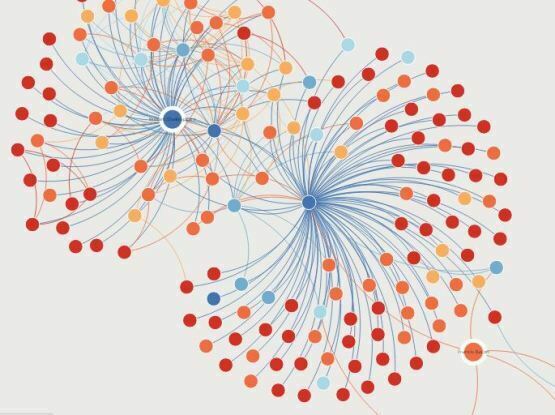
Could there be a better idea for a website than Six Degrees of Francis Bacon? Launched in beta form this week, the site is designed to demonstrate the social network of Britain over the period 1500-1700. Created by data miners and digital humanities scholars at Carnegie Mellon University and Georgetown University, the site uses data from the Oxford Dictionary of National Biography to show who was connected with whom in British society at the time.
The inspiration for the site is of course the modern parlour game, Six Degrees of Kevin Bacon, which became one of the Web’s most compelling sites, The Oracle of Bacon. This is based on the concept of six degrees of separation, which states that anyone on the planet can be connected to anyone else by no more than six degrees, applying the notion to the film career of Kevin Bacon. So, for example, Charlie Chaplin was in A Countess from Hong Kong (1967) with Tippi Hedren, who was in Jayne Mansfield’s Car (2012) with Kevin Bacon, so Chaplin has a Bacon rating of 2. The source data is derived from the Internet Movie Database, and because I get a credit on the IMDb for having been an interviewee on a television programme, I have a Bacon rating of 3 (Luke McKernan was in Holmfirth Hollywood (2006) (TV) with Christopher Dingli, who was in Agora (2009) with Rachel Weisz, who was in The 64th Annual Golden Globe Awards (2007) with Kevin Bacon). I’m that close to the stars…
One of the small disappointments of Six Degrees of Francis Bacon is that it does not give Francis Bacon ratings. I want to know that anyone in British society 1500-1700 was connected with Francis Bacon is some way, and to see that degree of connection quantified. The time range, and the relatively unstructured data source that is the ODNB (as opposed to the rigorous construction of film and TV credits), probably make that an impossibility – but it’s a shame, because the game element could have been enticing, and illuminating.

As it is, you see can see quickly who knew who in the 16th and 17th centuries. So you can see that Francis Bacon knew King James I who knew Samuel Daniel who knew Ben Jonson who knew William Shakespeare, to follow only what looks like the most direct route between the two men. Of course, the site isn’t about Francis Bacon, it’s about the true complexity of social networks, and it operates by demonstrating the connections that existed any individual, or pair of individuals, or group or network. Hence you can search by an individual name, so you can see the connections shared by say Thomas Middleton (the playwright, not the naval official) and Thomas Dekker, or explore groups such Catholics, Mathematicians, or Founder Members of the Royal Society. Colour coding indicates the strength of the degree of connection (somewhat surprisingly, a red node indicates that less is known about this person). You can also refine searches by relationship confidence level (the default relationship connection is two i.e. two degrees of separation), and time period.
One of the reasons the Francis Bacon rating wouldn’t work is because not everyone was connected to everyone else. For instance, I looked up an obscure favourite of mine, the playwright Dabridgecourt Belchier (great name, terrible writer) and it turns out the poor man wasn’t connected to anybody – a Bacon rating of absolute zero. So the data is limited (or else Belchier shunned human society), but it is possible for those interested to add their own information, by contributing names, suggesting relationships, or adding groups to the database.
Video guide to using Six Degrees of Francis Bacon
The site currently identifies 13,000 individuals with around 200,000 traceable relationships. Its most obvious limitation is a lack of information about the names. You get their name, birth and death dates, a two or three word description, and sometimes the groups to which they belong. Each name entry gives links to an ONDB record where it exists, and searches for that term on JSTOR (the academic article database) and Google, though the limitations of this are clear when you click on the Google link for Francis Bacon and the first person that turns up is the painter. Wikipedia links would be a welcome next step, especially for those not in academic institutions who will not have access to the subscription-based ONDB site.
But everything else is good, because it does illustrate what a rich set of associations can be demonstrated through the associates of the royal court, through the dramatists of that Elizabethan/Jacobean golden age, or the great flowering of scientific investigators of the seventeenth century. You see who knew who. You understand all the more the worlds in which they operated. As one, highly connected, entrant put it, ‘No man is an island, Entire of itself, Every man is a piece of the continent”. We have meaning for others because of social networks. We must strive to be Donnes or else we become Belchiers. I hope Six Degrees of Francis Bacon grows and continues to be supported – they do talk of “new and exciting features already in development“. And maybe they could open up the data, and someone somewhere will make a good game out of it.